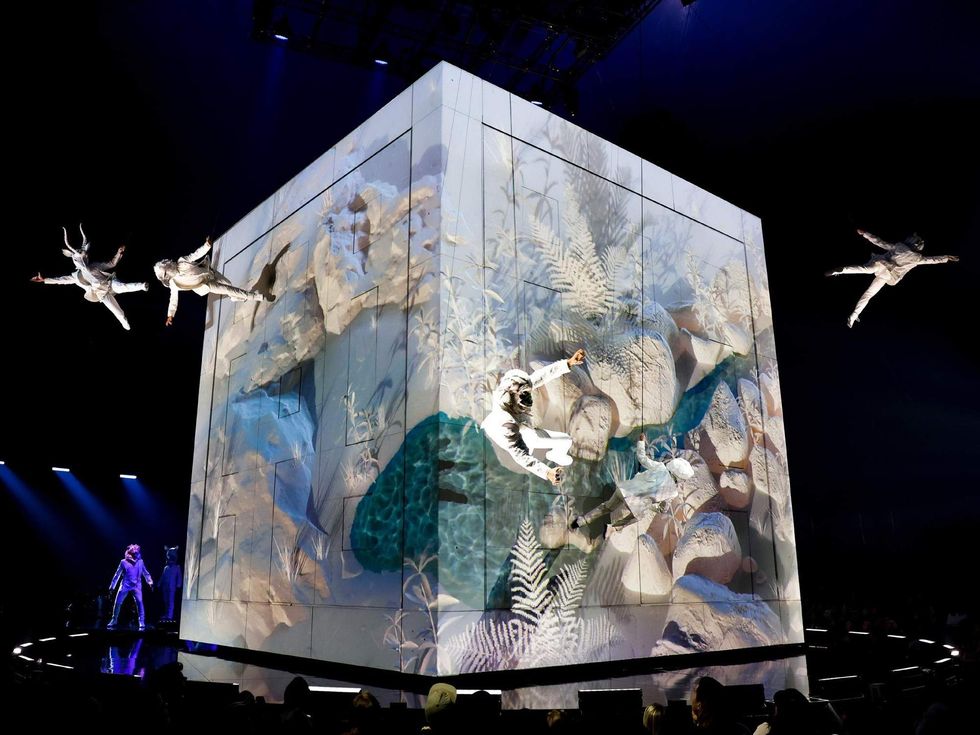Literarily Speaking
Salman Rushdie rocks Jones Hall, defends Steve Martin
 Rushdie defended Steve Martin, although a New York audience seemed to want theactor/author to be more of an entertainer.
Rushdie defended Steve Martin, although a New York audience seemed to want theactor/author to be more of an entertainer. Salman Rushdie wowed the Houston crowd.Photo by Rachel Eliza Griffiths
Salman Rushdie wowed the Houston crowd.Photo by Rachel Eliza Griffiths Rushdie said he is working on a memoir that will cover "The Satanic Verses"controversy, in part, so he can “answer everybody’s questions, and then afterthat I can say: well, read the damn book.”
Rushdie said he is working on a memoir that will cover "The Satanic Verses"controversy, in part, so he can “answer everybody’s questions, and then afterthat I can say: well, read the damn book.”
Novelist Salman Rushdie lived up to our previous rock star hyperbole by literarily, though not literally, rocking Jones Hall Friday night. Houston was the last stop of Rushdie’s reading tour for his latest novel Luka and the Fire of Life. Though the Fire of Life tour even sounds like it needs 30 roadies and 20 costume changes to produce, Rushdie ignited the audience’s imagination, using only the words of his story.
The large Jones Hall crowd was certainly ready to hear of Luka’s magical adventures as huge applause and several “Woo’s” greeted Rushdie’s arrival on stage. Perhaps Houston is better educated than Portfolio.com would have the world believe because, according to Inprint, our city gave Sir Salman the biggest audience he’s ever had for a reading.
Rushdie told Inprint that his largest audiences are usually between 800-1,000 people, but Inprint’s head count was approximately 1,800, with all of the orchestra seating and much of the mezzanine full. Rushdie might have recognized the size of the crowd from the stage because he greeted the audience with a statement of what a wonderful way it was to end his book tour.
“What are you all doing here?” he asked, before beginning his reading.
Luka and the Fire of Life, a novel aimed at both adults and young adults, is the story of 12-year-old Luka’s journey into the world of magic on a quest to steal a bit of the fire of life to save his dying storyteller father. Luka was written for Rushdie’s son, Milan, whose middle name is Luka, and is a sequel, of sorts, to his novel Haroun and the Sea of Stories, written 20 years ago for his older son Zafar. Salman Rushdie said that Milan Rushdie thinks of Luka as his own and his father as a “traveling salesman for his book.”
Rushdie read three selections from early chapters in the novel. The crowd seemed to most appreciate his dramatic reading of Luka’s riddle battle with the Old Man of the River. The laughter through Jones Hall proved that no one is ever too old to hear a tale of a fight to the death with “What do you call a fish without eyes?” and “What goes around and around the wood but never goes into it?” as weapons of choice. (The answers are “fsh” and “the bark of a tree.”)
After the reading, novelist Alexander Parsons conducted an interview that covered everything from the nature of storytelling to Rushdie’s equally dramatic real life story. Rushdie spoke of the different types of literary fiction and claims his own is flamboyant and “waves its arms about.” Fiction that feels free to do some arm waving is also the type he prefers to read, instead of “quietus,” subtle writers. The description “boring” also slipped out, but Rushdie half-heartedly took it back.
He also discussed the challenges of writing a screenplay adaptation for his Booker Prize winning novel Midnight’s Children. When answering a question about if he would advise young writers to head to Hollywood or Bollywood, he asked “Why send people to hell?”
He also managed to get in some quick criticism of the movie Slumdog Millionaire. He assured everyone that when Midnight’s Children finally makes it to screen, there will be no dance sequence ending.
Of course, no discussion with Salman Rushdie would be complete — no matter how much he might wish it to be and no matter how much Parsons appeared uncomfortable introducing it — without at least mentioning The Satanic Verses and the Ayatollah Khomeini’s death sentence on Rushdie. Parsons refused to even use the word fatwa, referring to the “F-word” throughout that portion of the interview.
Rushdie talked about how terrible it is “being famous for the wrong reason,” and spending years “trying to change the subject back,” but he appeared to have found a place of resolve about it all. He is working on a memoir and said one of the reasons is so that he can “answer everybody’s questions, and then after that I can say: well, read the damn book.” He promised the memoir will be novelistic and tell some stories that have not yet been told.
One interesting tangent that came up during this part of the conversation was Rushdie’s opinion of the recent Steve Martin vs 92nd St. Y kerfuffle. Martin was asked there to speak while promoting his latest book, a novel about the art world titled An Object of Beauty. When Martin and his interviewer, not so surprisingly, spent most of the conversation discussing the art world instead of his movie career, the Y offered attendees their money back.
Parsons brought up the subject as a way to segue into the discussion of The Satanic Verse controversy and to make a point about Rushdie’s history perhaps being fixed in the “public's imagination.” However, Rushdie paused to give his opinion of the Steve Martin story before he moved on to his own. He called Steve Martin a “wonderful writer and a wonderful speaker” and said the 92nd St. Y behaved “scandalously” and “disgracefully.”
Clearly, Rushdie is on Team Steve, and the Houston audience’s loud applause let the author know how they felt about that Philistine New York audience.
Perhaps the 92nd St. Y shouldn’t call Rushdie right away about booking him for a future memoir reading, but Inprint probably should. Krupa Parikh, Inprint’s marketing and outreach director, told CultureMap, “Everyone seemed to have enjoyed the evening and we've already received numerous compliments. Rushdie said he had a great time and would like to come back when he finishes his memoir. It is a truly successful event to us when both the audience and the writer have a good time.”
Obviously, no one from the Jones Hall audience is asking for their money back.





